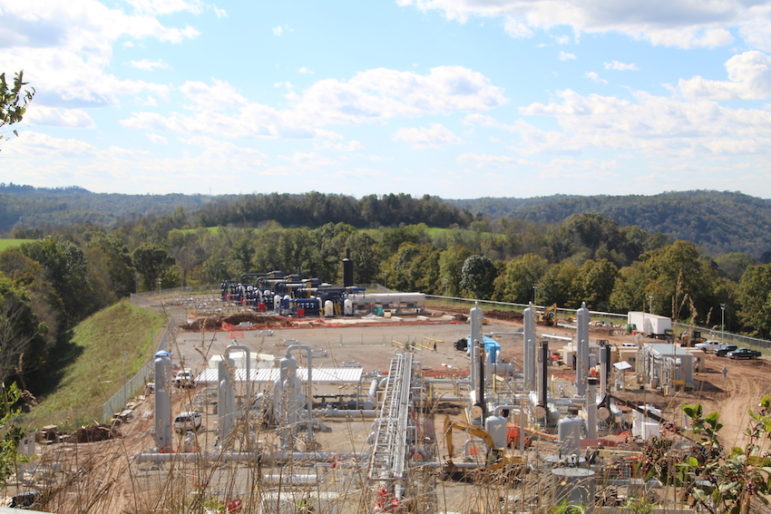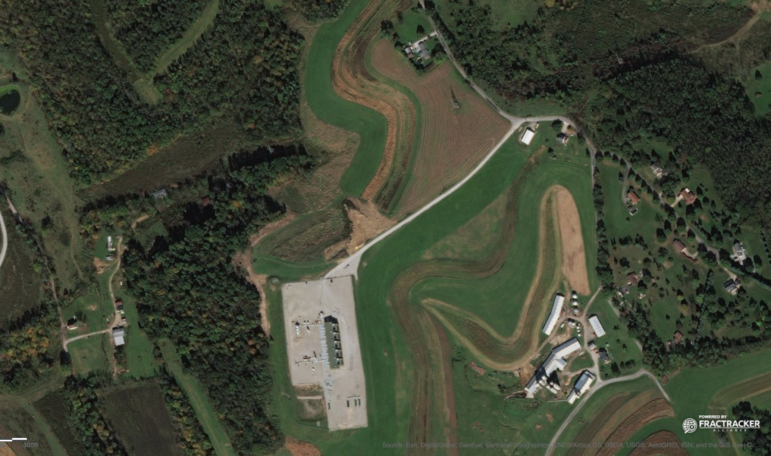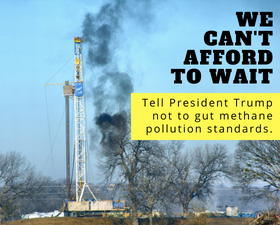Tyler Rivlin co-authored this blog with Leann Leiter.
No matter where Earthworks’ field staff go, we see the oil and gas industry’s air pollution. Whether visiting a new facility or returning to notorious polluters, the Community Empowerment Project continually documents air pollution all over the US that presents a threat to the health of those nearby and to the global climate. Our trip to Pennsylvania and Ohio this month–and the alarming air pollution we documented at sites new and old–is a timely reminder of the need for federal protections and the urgency of moving away from fossil fuels altogether.
New places, same problems
Russell Barrett, a proud Vietnam War veteran, explained that he doesn’t want to “shut the industry down,” and doesn’t see himself as “a tree hugger.” He simply wants things to be done right and to know that his family and neighbors are safe. Standing in front of their mobile home, the Barretts can glimpse parts of the sprawling Eureka Cain Ridge Compressor Station through the trees. Yet even when inside their home, they can’t forget it’s there due to the near-constant noise, which averaged 69 decibels at their front step when we visited earlier this month. “This is nothing,” Mr. Barrett told me. “It gets even louder at night.”

The Barretts compare odors from the compression and dehydration facility to the smell of hair permanent chemicals, and suspect that their recently-diagnosed breathing problems may be connected. According to Mr. Barrett, the family has reported odor and noise problems to the Ohio state Environmental Protection Agency (OEPA), but was told that the agency–which is tasked with overseeing facilities like the Cain Compressor–can’t do air testing at the compressor station without permission from the operator.
The Barretts aren’t alone in their concerns and growing frustration–several neighbors shared with Earthworks that they too are fed up with the noise, concerned about their exposures to air pollution, and have complained to the Ohio EPA, directly to Eureka, or both. Using one of our optical gas imaging (OGI) cameras, Earthworks’ certified thermographer Sharon Wilson recorded some of that air pollution pumping out of three of the engines at the site. Eureka plans to expand the facility to a total of nine engines and additional dehydration equipment by March 2019.
Persistent polluters
This month was Earthworks’ fourth visit to the MarkWest Brigich Compressor Station in Washington County, PA in the past year and a half. On each occasion (March and October 2017 and May 2018), our thermographers have recorded significant engine stack emissions. But this time, we were also concerned about a large plume of emissions from a combustion device–potentially indicating improper operation. Numerous homes sit within a half-mile radius.

MarkWest Energy Partners’ Bluestone Processing Plant is another site Earthworks has repeatedly monitored. We profiled how for years Bluestone skirted classification as a Title V facility and thus escaped stronger pollution controls in our report, Permitted to Pollute. In this most recent visit, one of the plant’s many large flares appeared to be only partially lit, releasing intense plumes of uncombusted pollution–just like it has on numerous other visits during which we’ve documented emissions and detected harmful air toxics.
Protecting the rules that protect people

Without fail, CEP’s time in the field makes evident the pollution from oil and gas development, and that current state rules and resources just aren’t enough to hold polluters accountable. This makes federal protections that much more important. But at this moment, the US Environmental Protection Agency (EPA), under direction of President Trump, is weighing a proposal to destroy critical safeguards that protect people and the climate from the air toxics and methane created by the oil and gas industry. We have to save these federal safeguards and tell EPA head Andrew Wheeler to do his job to put the public, not industry, first.
At the same time, states like Pennsylvania, Ohio, and others need to step up and make industry reduce its pollution with protections of their own. Ultimately, they also need to halt the expansion of oil and gas production and processing–and the dangerous pollution that inevitably comes with it.
FOR MORE INFORMATION:
- Visit the Community Empowerment Project homepage to learn more and request a visit from Earthworks
